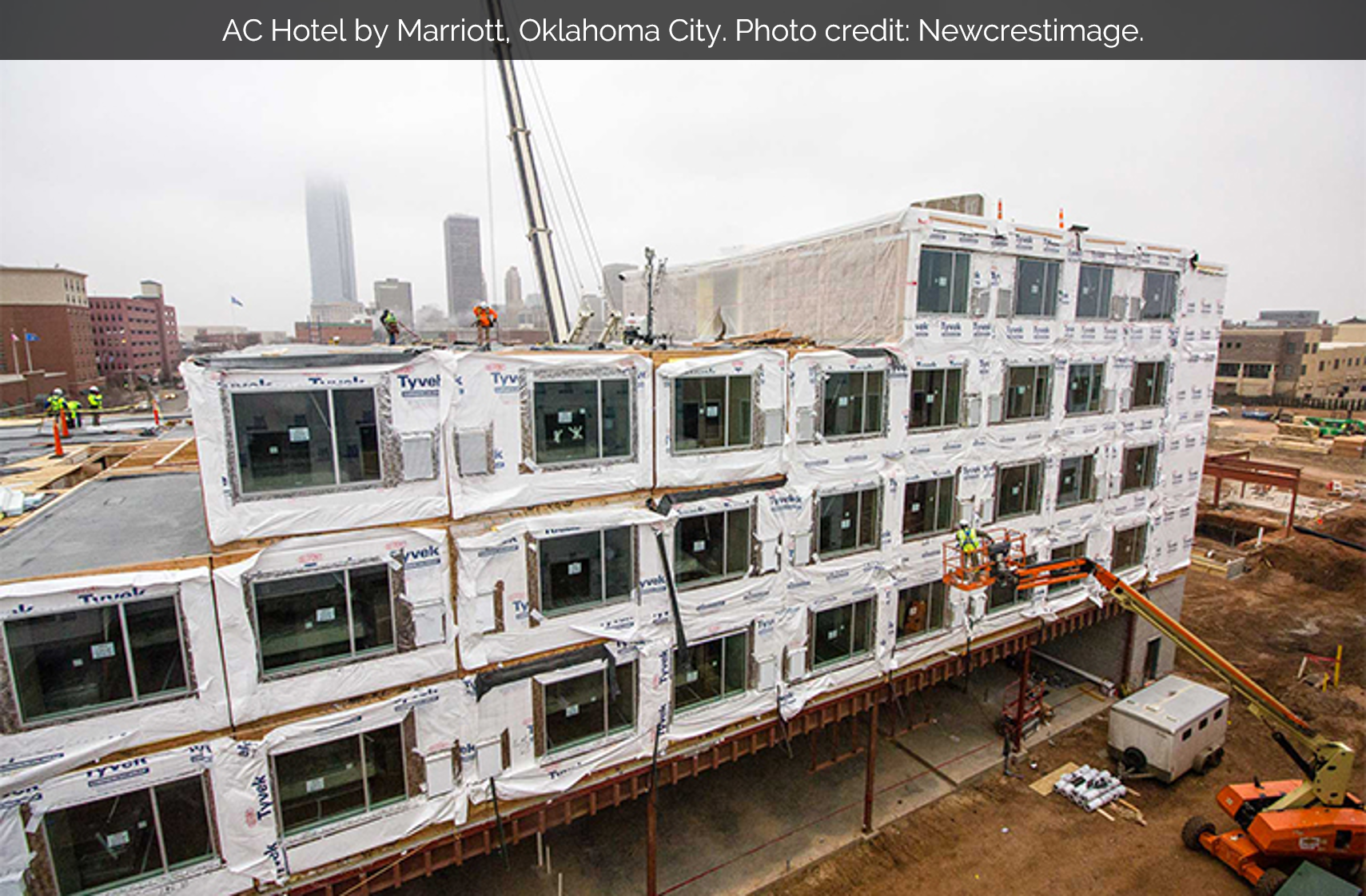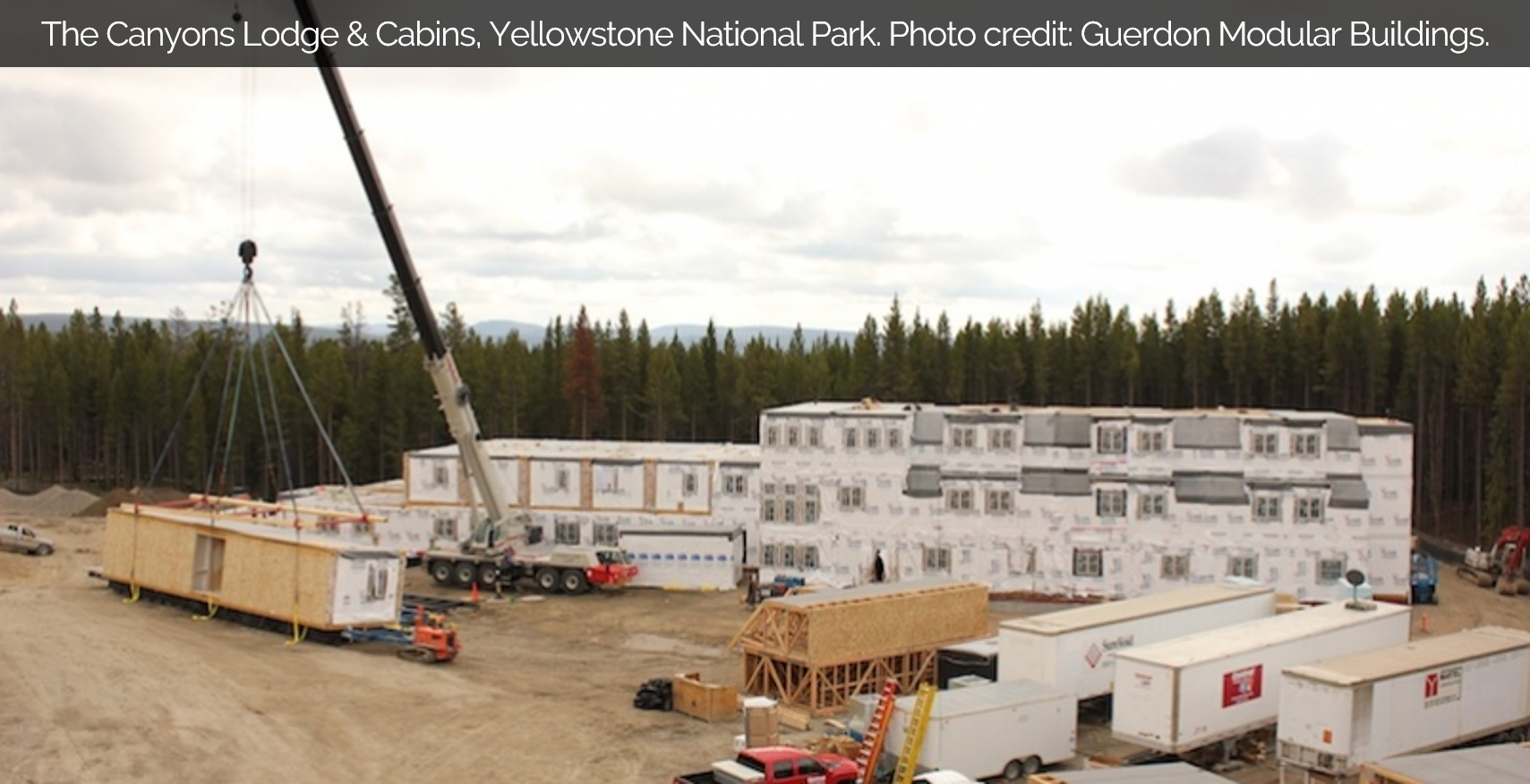The term “modular construction” once conjured images of small construction trailers or antiquated mobile home clusters just off the highway—not the most alluring draw for high-end developers and top-tier hotel companies, nor for their gentried clientele.
Today, however, the concept of modular construction has evolved, with developers across the U.S. adopting a modular approach to building 2- to 4-star select-service, full-service, and even boutique hotels.
This article gives a brief overview of the evolution of modular construction, as well as the potential benefits and challenges in terms of cost, timelines, and financing when harnessing this method to build hotels.
What is Modular Construction? What are Its Benefits?
Modular construction involves a process in which individual “modules” or “pods” are constructed or pre-fabricated off site within a controlled plant environment. The modules are then fitted together in ways that allow the unit to function as a unified structure.
 Sounds simple. But it’s important to understand how flexible modular construction is in practice. Developers can implement hotel bathroom pods or they can pre-fabricate an entire guestroom. Entire integrated, steel-framed hotel structures can be fabricated, transported, and stacked and sealed through the modular process on sites around the world.
Sounds simple. But it’s important to understand how flexible modular construction is in practice. Developers can implement hotel bathroom pods or they can pre-fabricate an entire guestroom. Entire integrated, steel-framed hotel structures can be fabricated, transported, and stacked and sealed through the modular process on sites around the world. While modules are being built at the factory, developers are busy breaking ground, laying the foundation, and performing grading operations at the building site. When the modules are complete with all fixtures and fittings, they arrive at a fully prepared site for installation and final finishes.
The method’s many benefits include:
Quality Control. Their assembly within these standardized facilities allows each module to achieve exact design specifications while meeting the same codes and standards as conventionally built structures.
Efficiency. According to Palomar Modular Building, a full-service modular building contractor, modular construction can reduce build time by up to 50% versus the time it would take to complete a project with traditional construction methods. [1]
Reduced Costs. By reducing the construction timeframe, developers can significantly reduce the costs of a build. In the past, transporting the modules was far more expensive than it is today, with a growing number of factory locations and improved techniques in packaging driving down costs.
Stronger Structures. Structurally, today’s modular buildings are designed to be both strong and durable. Each module is engineered independently and built to withstand the rigors of transportation and craning onto foundations. No more worries about loosely fitted walls coming apart in high winds.
Other Benefits. In addition to quality management and time savings, modular construction provides other benefits to the developers. By building most of the structural elements in a factory, developers avoid site disruption and vehicular traffic at the site. Safety and security are improved, as well. Modular construction also steers clear of issues such as scarcity of materials, problems securing skilled labor in certain areas, and weather conditions—all of which that can adversely affect the construction process.
Notable High-End Modular Hotels in the Pipeline
Modern-day modular construction doesn’t just apply to simple, budget hotel projects in rural or domestic markets. Here are some examples of high-end modular hotel construction on the rise.
citizenM Hotel, Manhattan
On Bowery Street in Manhattan, citizenM, a boutique and “affordable luxury” hotel brand, and Brack Capital are constructing a 300-room boutique hotel utilizing pre-fabricated guestroom pods built in Poland and shipped to New York. When completed, the 20-story hotel will comprise 210 stacked and sealed modular components.
For the Bowery project, modular construction has allowed for a significant reduction in the number of trips for delivery of materials through the congested streets of Manhattan, reducing construction time by several months. The hotel is scheduled to open mid-year 2017.
AC Hotel by Marriott, Oklahoma City
Farther west, NewcrestImage, a privately owned hotel development and construction firm, is planning to build its first hotel in Oklahoma City using modular construction technology. The 142-room AC Hotel Bricktown will be one of the first modular constructions in the Oklahoma City hotel market. All rooms and finishes will follow Marriott’s AC Hotel brand specifications, and the pre-fabricated construction will reportedly be indistinguishable from other AC branded hotels.
The hotel’s ground floor will be built using traditional construction. Dozens of pre-fabricated hotel rooms will then be lifted by crane and placed atop a one-story steel base forming the hotel’s lobby floor. The hotel, one of many modular hotel construction projects in Marriott’s development pipeline, is scheduled to open in the third quarter of 2017.
Xanterra Parks Project, Yellowstone National Park
In Wyoming, Xanterra Parks and Resorts is amid a 20-year, $134-million contract to rebuild and renovate lodging facilities throughout Yellowstone National Park. When all five buildings are completed, the Canyon Lodge & Cabins will comprise 410 guestrooms.
Modular technology has allowed the developer to assemble the first three buildings in six months, a far shorter timeframe than stick-built construction, while avoiding seasonal challenges. This has led to lower labor costs and helped the project achieve LEED Silver certification.
International Markets for Modular Hotel Construction
Modular construction is even more popular overseas. A couple of years ago, Hilton teamed with modular provider CIMC to build a Hampton Inn at Bristol Airport in the United Kingdom. This was Hilton’s initial push to build multiple properties using a new, more comprehensive modular technique where entire guestrooms are factory-built then shipped globally.
 In October 2016, Hilton announced plans to build Africa’s first modular hotel, the 280-room Hilton Garden Inn in the Ghanaian capital of Accra. Patrick Fitzgibbon, Senior Vice President of Development, EMEA, for Hilton Inc. recently spoke to the company’s efforts at “pioneering hotel growth on the [African] continent” over the past half century. Mr. Fitzgibbon called the new hotel in Ghana “…a fast-paced construction solution that we feel has huge potential in Africa, with quicker returns for investors and a world-class hospitality experience for guests.” [2]
In October 2016, Hilton announced plans to build Africa’s first modular hotel, the 280-room Hilton Garden Inn in the Ghanaian capital of Accra. Patrick Fitzgibbon, Senior Vice President of Development, EMEA, for Hilton Inc. recently spoke to the company’s efforts at “pioneering hotel growth on the [African] continent” over the past half century. Mr. Fitzgibbon called the new hotel in Ghana “…a fast-paced construction solution that we feel has huge potential in Africa, with quicker returns for investors and a world-class hospitality experience for guests.” [2] Similarly, InterContinental Hotels Group (IHG) recently launched its Innovation Hotel 2.0 concept, presenting ideas in sustainable tourism including the use of modular construction methods to reduce waste and energy consumption. Because these modules are factory-constructed, IHG believes it can deliver a more consistent product and include the use of environmentally friendly building materials and energy-saving technologies. In the age of sustainability and consumer awareness, this move could raise the company’s profile among potential commercial and leisure guests.
Potential Challenges
Labor
The use of pre-fabricated modular construction in markets where construction is predominately controlled by unionized labor can pose certain challenges. However, even in New York City where construction workers are heavily unionized, modular manufacturers are beginning to employ trade union members and work closely with local unions to ensure everyone is educated in the modular process.
In cities like Boston and Chicago, other heavily unionized markets, developers need to find ways to include union participation early on to avoid any opposition that can eat into the efficacy of the process. Again, this can prove tricky, with shortened construction times needing to be balanced by more projects to keep work volume consistent.
Developers of high-end residential and luxury hotels often find that highly detailed custom finishes are better left to skilled labor at the construction sites. Nevertheless, even high-end development projects have utilized combinations of pre-fabricated construction for the base building, with detailed finishes performed on site.
Costs
Measuring the cost of modular versus traditional construction is far from simple. The cost is based on a per-unit basis, and the savings can run from minimal to many millions of dollars, depending on the hotel product type, design, location, presentation, and amenities.
Given the efficiency of modular construction described above, some of the greatest savings are seen in areas with high labor costs. Furthermore, improved technology and quality control, reduced construction nuisances, and less general disruption in the neighborhood of the site can all contribute to overall cost savings.
However, there is an element of give and take. A savvy developer must weigh these benefits against any potential risks such as cost of packing and shipping the modules to the construction site, unexpected delivery delays, and possible conflicts with permits and inspections.
Financing and Insurance
Finally, is modular construction more difficult to finance or insure? Not necessarily, according to developers.
Promise Buildings, a provider of modular structures, notes that as far as appraisal and financing institutions are concerned, these buildings are delivered as real properties. [3] Accordingly, banks, lending agencies, and insurance agencies can treat modular hotel buildings the same as typical hotels that are constructed from the ground up.
Conclusion
More and more commercial contractors are adopting modular construction, and for good reasons. Given the higher quality control, faster built times, environmental benefits, and cost savings, it is no surprise that modular construction is gaining prevalence in the hotel industry. As major hotel companies like Marriott and IHG sign on for high-end luxury and boutique modular hotels, the industry should see these products come into even greater prominence in the near future.
[1] “The Benefits of Modular Building.” Palomar Modular Buildings. http://palomarmodular.com/industries/hotels-motels/. Retrieved April 13, 2017.
[2] Hilton Worldwide. “Hilton Builds for the Future at AHIF with Its First Modular Hotel in Africa.” Newsroom.Hilton.com. Retrieved April 13, 2017.
[3] Promise Buildings. “Common Questions about Modular Hotels.” www.promisebuildings.com. Retrieved April 13, 2017.
Republished from the Hotel Business Review with permission from www.HotelExecutive.com

0 Comments
Success
It will be displayed once approved by an administrator.
Thank you.
Error